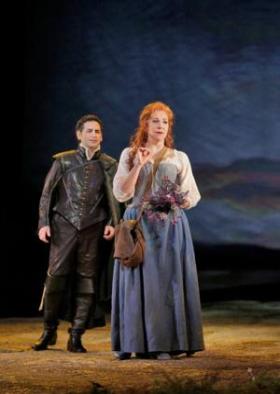A Rossini Rarity
When Gioachino Rossini was 23 (in point of fact, since he was a leap year baby, he was 5¾), he became composer in residence at the Teatro di San Carlo opera house in Naples. At the end of his 7-year stint, in 1822, he left with nine new operas and his future wife. Isabella Colbran was one of a company of first class singers at the Naples opera house, and the 7th of the 9 operas Rossini produced there was a vehicle for her remarkably flexible coloratura mezzo-soprano voice. His opera seria, La Donna del Lago (The Lady of the Lake), was based on Sir Walter Scott’s narrative poem, which inspired a wave of fascination that Romantic composers had for all things Scottish – some of the most famous examples being Mendelssohn’s Scottish Symphony and Hebrides Overture, Ellen’s Third Song (the Ave Maria) by Schubert, and Donizetti’s Lucia di Lammermoor.
La Donna del Lago calls for a curious range of vocal forces, and this may be why it is not standard repertoire in opera houses – the Met is currently presenting it’s first-ever production, 196 years after Rossini conducted the first performance. (The live broadcast is coming up this Saturday on WBJC at 1.00 p.m.) The part that Rossini wrote for Colbran is the beautiful Elena. She is loved by no less than three men: Malcolm, a “pants role” coloratura contralto (a kilt-wearing contralto in this instance) whom Elena loves; Rodrigo, the Highland chief (a tenor), whom her father, Douglas (a bass), is forcing her to marry; and Uberto (another tenor), who is really King James of Scotland in disguise – Scott based his poem on the thread of a story that James V liked to wander about his kingdom incognito.

Juan Diego Flórez and Joyce DiDonato in Rossini’s La Donna del Lago.
Photograph by Ken Howard, courtesy the Metropolitan Opera
So here we have, in the principal roles, a mezzo-soprano lead, (the transporting Joyce diDonato), her contralto love interest (Daniela Barcellona), her coloratura bass father (Oren Gradus), her loathed tenor suitor (John Osborn), and her disguised tenor suitor (the incomparable Juan Diego Flórez). What a mix! Yet, Rossini – being Rossini – makes it work superbly. The haunting first-act duet with Elena and Malcolm, and the way the mezzo and contralto voices entwine, made me think of Richard Strauss’s much later heart-stopping trio at the end of Der Rosenkavalier. The duets between Joyce diDonato and Juan Diego Flórez, with the mellow timbre of her mezzo matching the brilliant tessitura of his tenor, are breathtaking. It’s certainly uncommon to have a trio with a mezzo and two tenors, but the character of the two tenor voices is so individually unique that, again, the music is really moving.
Naples was the musical center of Italy at the time that Rossini was composing there, and he had not only a fine stable of singers to draw from, but also the very best orchestral musicians. His writing for woodwinds, in particular, is arresting in La Donna del Lago, and I kept finding that my ear was drawn to a clarinet solo here or an oboe line there. Because the opera is a rarity, it is intriguing to listen to quintessentially recognizable Rossini – the melodic lines, the accelerandos, the steadily building crescendos – and yet hear music one has never come across before. It’s like seeing a painting by a well-known master that has been in a private collection, and which is on public display for the first time.
La Donna del Lago by Gioachino Rossini, live from the Met 1.00 p.m. Saturday, March 14th, on WBJC.
Tags:Joyce DiDonato, Juan Diego Floréz, Met Live in HD, Metropolitan Opera, rossini





